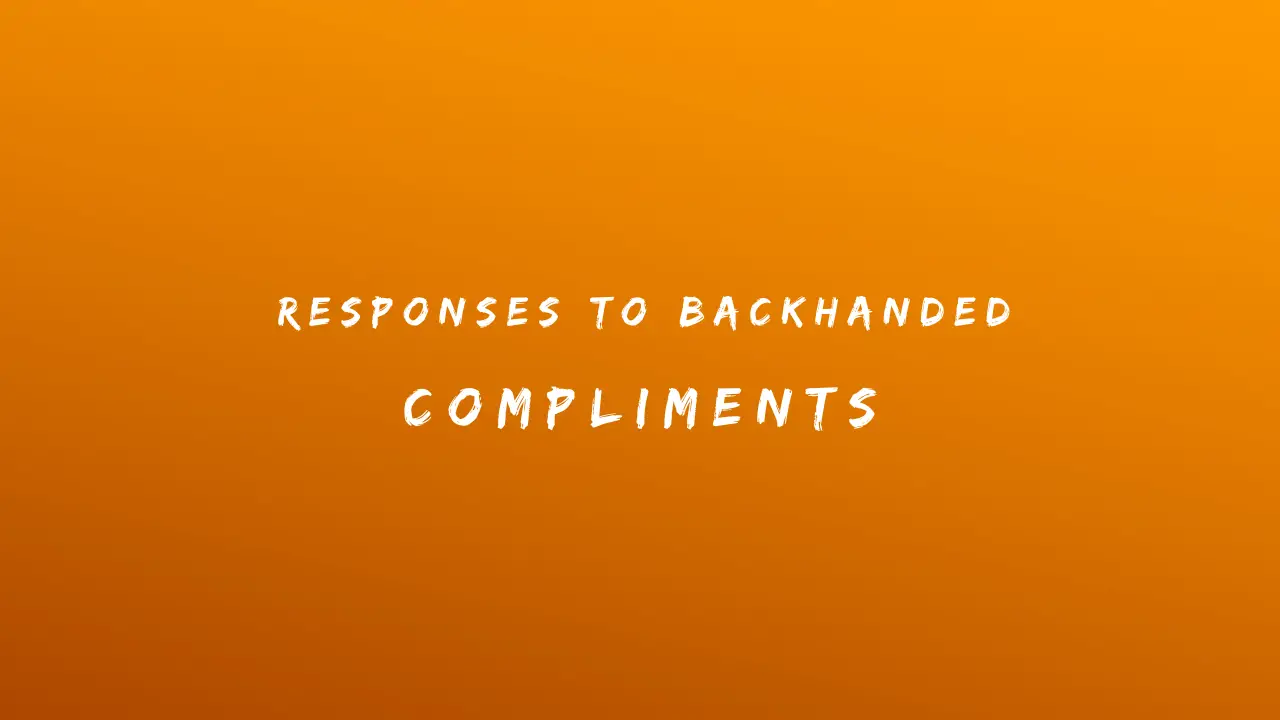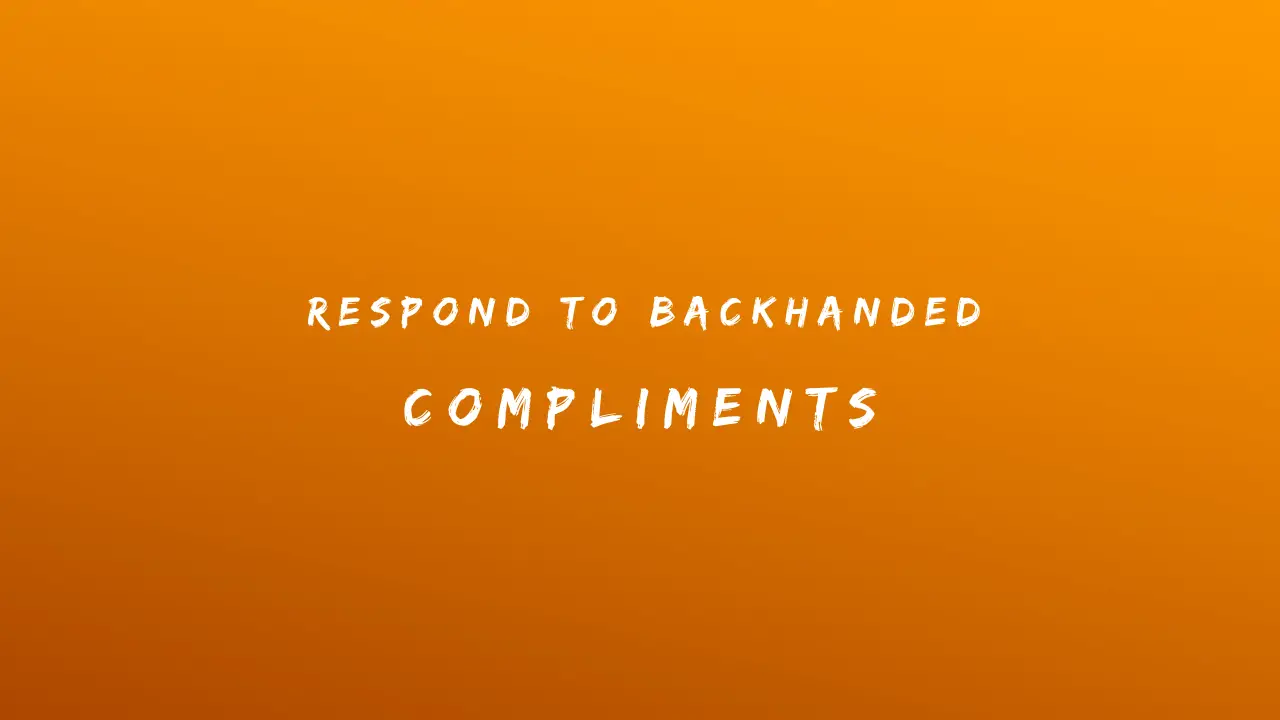Backhanded compliments—aren’t they the most confusing form of flattery? It’s like someone offers you a compliment wrapped in shade. While it may sound nice, these remarks often have an underlying jab. So, how do you navigate these tricky waters? Let’s dive into the world of backhanded compliments and discover how to respond like a pro.

200+ Responses to Backhanded Compliments
Humorous Responses
- Thanks! I didn’t realize I was trying so hard!
- Oh, so you noticed? I thought I was being subtle!
- Well, I aim to be average!
- That’s the most excellent thing anyone has said to me today!
- Thanks! I’ll add that to my list of things I didn’t need to know.
- I appreciate the compliment and the confusion!
- Isn’t it great how I can excel at being mediocre?
- Wow, that’s a compliment wrapped in a puzzle!
- Thanks! I thought my effort would go unnoticed!
- You know me too well; I’m an expert at the bare minimum!
Assertive Responses
- I appreciate the compliment, but it feels mixed.
- Thanks, but I’d prefer a straightforward compliment next time.
- That didn’t come across as flattering; can we try again?
- I’m not sure how to take that, but I value directness.
- I’d rather hear something honest than a backhanded compliment.
- I’d like to understand your intention behind that remark.
- Thanks, but it’s more constructive to be direct.
- I’m comfortable with my identity, even if it’s not your style.
- Can we focus on the positive without the backhand?
- I’m confident in my choices, even if they’re not for everyone.
Confident Responses
- Thanks! I’ve worked hard to be myself.
- I appreciate your perspective; it’s made me stronger.
- I’m proud of who I am, and I won’t apologize for it.
- Thanks for noticing! I embrace my uniqueness.
- I’ve learned to own my quirks; they make me me.
- Your opinion doesn’t define my self-worth.
- I appreciate the compliment; it reflects my individuality.
- I see the value in what makes me different.
- Thanks! I’ve come a long way in my journey.
- Your words won’t shake my confidence.
Passive Responses
- Oh, that’s interesting.
- Thanks for sharing your thoughts.
- I’ll take that under advisement.
- Hmm, okay.
- I didn’t expect that, but thanks.
- Right, I see.
- That’s one way to put it.
- I guess I can see where you’re coming from.
- Thanks.
- I’ll think about what you said.
Empathetic Responses
- I understand where you’re coming from; thanks for sharing.
- It sounds like you’re expressing a lot; I appreciate it.
- You might be trying to help, but it felt off.
- I know you meant well; it just didn’t hit right.
- Your perspective is valuable, but I’m sensitive to wording.
- I appreciate your intention; let’s keep it positive.
- It’s clear you care, but it would help to be direct.
- Thanks! I know compliments can be tricky sometimes.
- I hear your intention; let’s focus on the positives.
- I understand it’s not easy to express; thanks for trying.
Inquisitive Responses
- What do you mean by that?
- Can you explain what you meant?
- I’m curious about your thought process behind that.
- Was that meant to be a compliment?
- How do you think that makes me feel?
- Can you clarify your intention?
- What led you to say that?
- I’d love to hear more about your perspective.
- Why do you think I take that as a compliment?
- What were you hoping to convey with that comment?
Defensive Responses
- That wasn’t necessary; I know my worth.
- I didn’t ask for your opinion on my appearance.
- That comment is rude.
- I’d prefer not to discuss my choices if they’re not supportive.
- I’m happy with myself, regardless of what you think.
- Your words don’t affect my self-esteem.
- I’m not here for criticism disguised as compliments.
- That feels more hurtful than helpful.
- I can handle honesty, but that felt like an attack.
- I’d appreciate it if you kept your thoughts to yourself.
Reflective Responses
- That comment makes me think about how I present myself.
- I see how my choices can be interpreted in different ways.
- I’ll take a moment to reflect on how I communicate.
- It’s interesting how different perspectives can shape our views.
- I appreciate that you’ve given me something to think about.
- This makes me reflect on how I value myself.
- Your comment has opened my eyes to how others see me.
- I never considered that angle; it’s thought-provoking.
- I’ll reflect on the intention behind the compliments I receive.
- That’s a unique perspective; I’ll think more about it.
Polite Responses
- Thank you for your input; I appreciate it.
- I’ll take that as a compliment; thank you.
- Thank you for sharing your thoughts.
- I appreciate your honesty, even if it’s a bit mixed.
- That’s an exciting way to look at it; thank you.
- Thanks for the feedback; I’ll keep it in mind.
- I appreciate the sentiment; thank you for that.
- Thank you for your perspective; I value your opinion.
- I’m glad you noticed; thank you!
- Thanks! I appreciate you bringing that up.
Creative Responses
- Thanks! I’ll add that to my collection of unique compliments!
- I love how you’ve made a compliment sound like a riddle!
- That’s an intriguing twist; I might use it in a story!
- You just made ‘compliments with a twist’ a new genre!
- Thanks! I didn’t realize I was a character in your narrative!
- Wow, I didn’t know I was that complex—thank you!
- You’ve turned a compliment into an art form!
- That’s a compliment with layers; I appreciate the creativity!
- I’ll have to work on my backhanded compliment reply skills!
- Thanks! I always love a little mystery in a compliment!
Educational Responses
- I’d love to share why that’s not a compliment.
- It’s interesting how backhanded compliments can be perceived; let’s discuss!
- We should consider how we phrase our compliments.
- Did you know that backhanded compliments can be hurtful?
- Let’s talk about how honest feedback is more valuable than mixed messages.
- It’s essential to consider the impact of our words; thanks for the reminder.
- Compliments work best when they’re straightforward; just a thought!
- I appreciate your attempt at a compliment, but clarity is essential!
- Your comment could be a learning moment about communication!
- Let’s explore why that might not be taken as a compliment.
Supportive Responses
- I see that you’re trying to help; I appreciate the thought.
- It seems like you’re expressing a concern; let’s discuss it.
- I know we all have different tastes; thanks for sharing!
- Your perspective is valid, and I appreciate you sharing it.
- I understand where you’re coming from; let’s focus on the positives!
- Thanks for your input; I know it comes from a good place.
- I value your opinion, even if it’s a bit mixed.
- Let’s support each other with direct compliments!
- Your feelings are important to me, and I appreciate your honesty.
- Thank you for trying to uplift; let’s keep the focus positive!
Gracious Responses
- Thank you; I’ll take it as a compliment!
- I appreciate your unique perspective; thank you!
- That’s kind of you to say, even if it’s a little mixed!
- Thank you for your thoughts; they mean a lot!
- I’ll accept that graciously; thank you!
- Thanks for your input; I appreciate you sharing!
- Your perspective is appreciated; thank you!
- Thank you! I appreciate the thought behind it!
- I’m grateful for your feedback, even if it’s unexpected!
- Thank you for your honesty; I’ll consider it!
Curious Responses
- What do you mean by that comment?
- I’m interested in how you came to that conclusion.
- Can you tell me more about what you’re thinking?
- I’d love to understand your perspective better.
- What led you to phrase it that way?
- Why do you think that comment works as a compliment?
- What made you say that? I’m curious!
- How did you come to that opinion?
- What was your intention behind that remark?
- Can we explore what you meant together?
Empowerment Responses
- I appreciate your input, but I’m confident in myself.
- Thank you! I’m proud of who I am.
- I’m learning to embrace my uniqueness, so thanks!
- I find strength in my differences; I appreciate your thoughts.
- Your comment reminds me to stand firm in my choices!
- Thanks! I’m becoming more empowered in my identity.
- I appreciate your perspective; it encourages me to be myself.
- Your feedback helps me reinforce my self-acceptance!
- I’ll take that as motivation to continue being authentic!
- Thanks for the reminder to stay true to myself!
Understanding Backhanded Compliments
- What are Backhanded Compliments?
A backhanded compliment is a remark that appears to be a compliment but carries an insult or negative implication. For instance, saying, “You look great for your age,” suggests that the person usually doesn’t look great. It’s a disguised compliment, often confusing and frustrating the recipient.
- Why Do People Use Them?
People might use backhanded compliments for various reasons, including their insecurities or a desire to assert dominance in social situations. They might think they are being clever or funny, but the impact can often be quite the opposite.
- Common Examples of Backhanded Compliments
“You’re so brave for wearing that!”
“You’re smarter than you look.”
“I wish I could pull off that hairstyle like you do.”
These examples show how a seemingly lovely comment can take a sharp turn, making the recipient feel awkward or insulted.
The Psychology Behind Backhanded Compliments
- Social Dynamics and Insecurities
Often, backhanded compliments stem from the giver’s insecurities. If someone feels threatened by your achievements, they might resort to backhanded remarks to elevate themselves. It’s a way of masking jealousy with a thin veneer of politeness.
- Cultural Perspectives on Compliments
Cultural background also significantly influences how compliments are delivered and received. In some cultures, indirectness is a way to be polite, while in others, straightforwardness is valued. Understanding these nuances can help you interpret the intention behind a backhanded compliment.
Choosing Your Response Style
Here are a few effective styles for responding to backhanded compliments:
- The Polite Acknowledgment
Sometimes, the best way to handle a backhanded compliment is to acknowledge it without adding fuel to the fire. For instance, you might say, “Thanks! I appreciate the compliment,” and leave it at that. This response is courteous yet deflects any negativity.
- The Humorous Comeback
If humor is your style, consider turning the comment into a joke. Responding with something like, “Thanks! I guess I’ll take ‘brave’ over ‘boring’ any day,” can lighten the mood while asserting your confidence.
- The Assertive Reply
For a more straightforward approach, you could say, “I prefer compliments that don’t come with a backhand,” which communicates your discomfort without being confrontational. This kind of response sets clear boundaries.
- Using Empathy in Responses
Recognizing that the person giving the backhanded compliment might be struggling with their issues helps frame your response. You could respond empathetically, saying, “I understand that might have been a joke, but it didn’t feel great.” This can open up a dialogue and potentially change their behavior.
Situational Responses to Backhanded Compliments
- In Professional Settings
In a workplace context, it’s essential to maintain professionalism. A response like, “I appreciate your input, but let’s focus on the positive,” can help steer the conversation back on track.
- Among Friends and Family
With friends and family, you might feel more comfortable calling them out. A playful, “Wow, that was a compliment wrapped in a roast!” can keep things light while still addressing the comment.
- Online Interactions
In the digital world, responding to backhanded compliments can be tricky since tone can easily be misinterpreted. A simple “Thanks! I like it too,” can serve to acknowledge the comment without engaging in negativity.
Preventing Backhanded Compliments
- Communication Strategies
Clear communication is critical. If someone often gives backhanded compliments, it might help to address it directly. You could say, “I appreciate compliments, but I prefer them to be straightforward.”
- Setting Boundaries
Establishing boundaries about how you want to be treated can prevent future backhanded remarks. Make it clear that you prefer positivity over passive-aggressive comments.
When Backhanded Compliments Become Toxic
- Recognizing Toxic Behavior
If someone consistently uses backhanded compliments to undermine you, it may indicate a toxic relationship. Recognizing this behavior is crucial to maintaining your mental health.
- Steps to Take in Toxic Situations
In such cases, it might be necessary to distance yourself from that person. Consider having a candid conversation about how their remarks affect you, or seek support from friends who uplift you.
Conclusion
In conclusion, mastering the art of responding to backhanded compliments can significantly boost your confidence and improve your interpersonal skills. With over 150 clever responses at your fingertips, you’re now equipped to handle these tricky situations with grace and wit. Remember, how you react to backhanded remarks can set the tone for future interactions and help you maintain self-esteem. If you’re looking to expand your conversational repertoire,
Check out our guide on:
React to “You’ve Changed” 150+ Powerful Responses
FAQs
Q. What is a backhanded compliment?
A backhanded compliment is a statement that sounds like a compliment but implies an insult or negativity.
Q. Why do people give backhanded compliments?
People often use backhanded compliments to mask insecurities, assert dominance, or unintentionally express jealousy.
Q. How should I respond to a backhanded compliment at work?
A polite acknowledgment or a redirection to positive feedback can be practical in professional settings.
Q. Can backhanded compliments affect self-esteem?
Yes, they can impact self-esteem by undermining the recipient’s confidence and creating confusion about the giver’s intentions.
Q. What are some examples of effective responses?
Responses like polite acknowledgments, humorous comebacks, or assertive replies can effectively address backhanded compliments while maintaining confidence.











0 thoughts on “Respond to Backhanded Compliments: 150+ Responses”